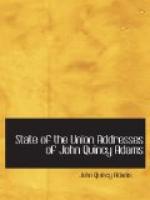The conventions of March 7th, 1815, and of October 20th, 1818, will expire by their own limitation on October 20th, 1828. These have regulated the direct commercial intercourse between the United States and Great Britain upon terms of the most perfect reciprocity; and they effected a temporary compromise of the respective rights and claims to territory westward of the Rocky Mountains. These arrangements have been continued for an indefinite period of time after the expiration of the above mentioned conventions, leaving each party the liberty of terminating them by giving twelve months’ notice to the other.
The radical principle of all commercial intercourse between independent nations is the mutual interest of both parties. It is the vital spirit of trade itself; nor can it be reconciled to the nature of man or to the primary laws of human society that any traffic should long be willingly pursued of which all the advantages are on one side and all the burdens on the other. Treaties of commerce have been found by experience to be among the most effective instruments for promoting peace and harmony between nations whose interests, exclusively considered on either side, are brought into frequent collisions by competition. In framing such treaties it is the duty of each party not simply to urge with unyielding pertinacity that which suits its own interest, but to concede liberally to that which is adapted to the interest of the other.
To accomplish this, little more is generally required than a simple observance of the rule of reciprocity, and were it possible for the states-men of one nation by stratagem and management to obtain from the weakness or ignorance of another an over-reaching treaty, such a compact would prove an incentive to war rather than a bond of peace.
Our conventions with Great Britain are founded upon the principles of reciprocity. The commercial intercourse between the two countries is greater in magnitude and amount than between any two other nations on the globe. It is for all purposes of benefit or advantage to both as precious, and in all probability far more extensive, than if the parties were still constituent parts of one and the same nation. Treaties between such States, regulating the intercourse of peace between them and adjusting interests of such transcendent importance to both, which have been found in a long experience of years mutually advantageous, should not be lightly cancelled or discontinued. Two conventions for continuing in force those above mentioned have been concluded between the plenipotentiaries of the two Governments on August 6th, 1827, and will be forthwith laid before the Senate for the exercise of their constitutional authority concerning them.




